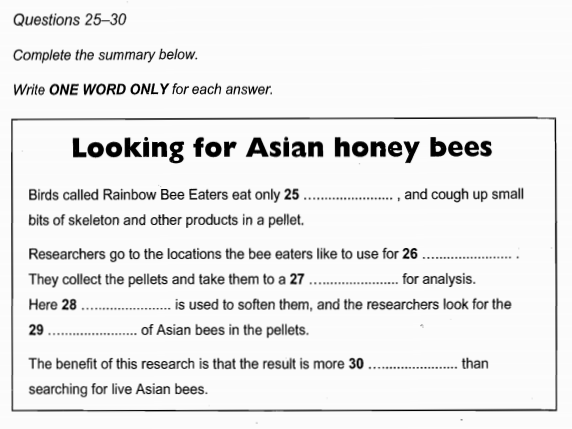剑桥雅思8听力:Test2雅思听力Section3真题及解析
发布时间:2020-12-03 关键词:SECTION 3
PROFESSOR:
Good morning everyone. In today's seminar, Grant Freeman, a biologistwho specialises in identifying insects, and who works for the Australian Quarantine Service, has come to talk to us about his current researchwork. Right, well, over to you, Grant.
GRANT:Good moming, everyone. I'm sure that you know that the quarantine service regulates all food brought into Australia. Well, obviously they wantto prolect Australia from diseases that might come in with imported goods,but they also wan to prevent insect pests from beling introduced int thecountry. and that's where | have a part to play. Anyway, my current research inwolves trying to find a particular type of bee, the Asian HoneyBee, and finding out whether there are any of them around in vanious
states of Austrila. We discovered a few of them in Queensland once and (eradicated them. Now, we'e pretty keen to make sure that there aren't any more glting in, particularly to New South Wales and other states.
STUDENT 1:What's wrong with Asian Honey Bees? Are they so dfferent from Australan bees?
GRANT: Well, in fact, they look almost the same, but they are infested with mites- microscopic creatures which live on them, and which can seriously damage our own home-grown bees, or could even wipe them out,
PROFESSOR:Well, what would happen if Australian bees died out?
GRANT:Well, the honey from Australian bees is of excellent qulity, much betterthan the stuff the Asian bees produce. In fact, Austaila exports nalveQueen bees to a large number of countries because of this. When theEuropean Honey Bee was first discovered out in the bush, we found theymade really unpleasant honey and they were also 1o0 big to pllinate many of our native flowers here in Australia.
STUDENT 2:That must have had a devastating ffet on the natural flora. Did you loseany species?
GRANT:No, we managed to get them under control before that happened butifAsian bees got In there could be olther consequences. We could lose a lotof money because you might not be aware, but it's estimated that nativebees' pllination of flower and vegetable crops is worth 1.2 bllion dollars ayear. So in a way they're the farmers' friend. Oh, and another thing is, ifyou're stung by an Asian Honey Bee, It can produce an alergic reaction Insome people; so they're much more dangerous than native bees.
PRFESSOR:How will you know if Asian bees have entered Austalia?
GRANT:
We're looking at the diet of the bird called the Rainbow Bee Eater. TheBee Eater doesn't care what it eats, as long as they're insects. But theintresting thing about this bird is that we are able to analyse exactly whatit eats and that's really helpful if we're loking for introduced insedts.
PROFESSOR:How come?
GRANT:Because insects have their skeletons outside their bodies, so the Bee Eaters digest the meat from the inside. Then they bring up all theindigestible bits of skeleton and, of course, the wings in a pellet - a smallball of waste material which they cough up.
PROFESSOR:That sounds a bit unpleasant. So, how do you go about it?
GRANT:In the field we track down the Bee Eaters and find their favourile fedingspots, you know, the places where the birds usually feed. It's here that Wecan find the pllets. We cllect them up and take them back to the laboratory to examine the contents.
PROFESSOR:How do you do that?
GRANT:The pellets are really hard, especialy if they have been out in the sun fora few days so, first of al, we treat them by adding water to moisten themand make them softer. Then we pull them apart under the microscope.Everything's all scrunched up but we're looking for wings so we just pullthem all out and straighten them, Then we identify them to see f we canfind any Asian bee wings.
PROFESSOR:And how many have you found?
GRANT:So far our research shows that Asian bees have not entered Australia inany number - it's a good result and much more follable than trying to findlive ones as evidence of introduced insocts,
PROFESSOR:Well, that's fascinating! Thank you, Grant, for those insights. I hope thatyou might inspire some of our sludents here to conduct some similarexperiments.
第3节
:
大家早上好。在今天的研讨会上,专门研究识别昆虫的生物学家格兰特·弗里曼(GrantFreeman)为澳大利亚农业部的检疫局,来跟我们谈谈他目前的研究工作。好吧,好吧,给你,格兰特。
授予: 好妈妈,各位我相信你知道隔离服务管理所有进入澳大利亚的食物。嗯,很明显,他们想从可能进口商品进来的疾病中使澳大利亚免受污染,但他们也想防止害虫在进口中传播。这就是有一部分可以扮演。无论如何,我目前的研究狼试图找到一种特定类型的蜜蜂, 亚洲蜜蜂, 并找出是否有他们周围在万尼乌斯奥斯特拉州。我们在昆士兰州发现了一些, 并 (消灭了他们。现在,我们希望确保没有任何的滑翔,特别是新南威尔士州和其他。
学生 1:亚洲蜜蜂怎么了?他们如此多发吗?澳大兰蜜蜂?
授予:嗯, 事实上, 他们看起来几乎一样, 但他们被小虫侵扰- 生活在它们上的微观生物,可以严重损害我们自己的自家蜜蜂,甚至可以消灭他们,
:那么,如果澳大利亚蜜蜂死了会怎么样?
授予:嗯,来自澳大利亚蜜蜂的蜂蜜难,比亚洲蜜蜂生产的东西好得多。事实上,奥斯塔伊拉出口纳维昆蜜蜂到许多,因为这个。当欧洲蜜蜂次被发现在灌木丛中时, 我们发现它们制作了不愉快的蜂蜜, 它们也是 1o0 大的我们在澳大利亚的许多本地花卉。
学生2:那对自然植物群有毁灭性的影响。你失去了任何物种吗?
授予: 不, 我们设法在事情发生之前控制了他们, 但阿西亚蜜蜂进入那里可能会有更可怕的后果。我们可能会失去钱,因为你可能不知道,但据估计,本地蜜蜂的花卉和蔬菜作物的种植价值1.2亿美元一年。所以从一个方面说,他们是农民的朋友。哦,还有一件事是,如果你被亚洲蜜蜂叮咬,它会在一些人中产生过敏反应;所以它们比本地蜜蜂危险得多
普雷费索尔: 你怎么知道亚洲蜜蜂是否已经进入澳大利亚?
授予:我们正在研究一种叫做彩虹蜜蜂食客的鸟的饮食。吃蜜蜂的人不在乎它吃什么, 只要它们是昆虫。但是,关于这只鸟最令人担心的是,我们能够准确分析它吃什么,这真的很有帮助,如果我们为介绍的 insedts 而选择。
:怎么会这样?
授予:因为昆虫有他们的骨骼在身体之外,所以蜜蜂食客从里面消化肉。然后,他们拿出所有可消化的骨架位,当然还有颗粒中的翅膀——一小块废物,它们咳嗽起来。
:听起来有点不愉快。那么,你如何去做呢?
授予:在田野里,我们追踪食蜂者,并找到他们偏爱的食蜂点,你知道,鸟类通常喂食的地方。在这里,Wecan 找到了小板。我们把他们接走,带他们回到实验室检查的内容。
:你是怎么做到的?
格兰特:这些颗粒坚硬,特别是如果它们已经在太阳下暴晒了几天,首先,我们给它们加水润湿,使它们变软。然后在显微镜下把它们分开。所有的东西都乱成一团但我们在找翅膀我们把它们都拉出来,拉直,然后我们识别它们,看看是否能找到亚洲蜂的翅膀。
:你找到了几个
格兰特:到目前为止,我们的研究表明,没有任何数量的亚洲蜜蜂进入澳大利亚。这是一个的结果,也比试图寻找活着的生物作为被引入的生物的证据要容易得多。
:那真是太棒了!格兰特谢谢你的真知灼见。我希望你能启发我们这里的一些懒人来做一些类似的实验。


剑桥雅思8听力原文解析:
SECTION 3
谈话场景:学术话题讨论 人物关系:、生物学家和学生 谈话话题:以研讨会的形式,主题为澳大利亚蜜蜂
师资点题剑桥雅思8听力:
交际与语言表达
1. 本段对话是关于一个研讨会,对话在 professor 与生物学家 Grant Freeman 之间进行, 偶尔还有学生插话。最开始,介绍 Grant Freeman, a biologist who... and who...是同位语部分,who是定语从句引导词,修饰biologist。specialize in doing 意为“专攻,专门研究”; specialist是同根词,意为“”;specialty 意为“专长,特长”的意思。
2. over to you 意为“轮到你了”。比如一个人回答完一个问题,和下一个人说 over to you now.这一短语除了在电视中的知识竞赛中经常出现之外,BBC 播报新闻的时候也会出现。BBC有演播室,当一个演播室里的新闻说完传给下一个演播室时,就会说 over to sb. now。
3. Grant首先解释了检疫局的作用——管理所有进入澳大利亚的食物。显然他们想要保护澳 大利亚免受进口食物带来的疾病的影响,而且他们也想预防昆虫灾害进入这个(obvi- ously they want to protect Australia from diseases that might come in with imported goods, but they also want to prevent insects pests from being introduced into the country)。protect...from... 意为“保护...使不受害或受损”,同义短语有 preserve... from... ;prevent sb./sth. (from) doing sth.意为“预防 / 阻止...做...”,同义短语有 stop... from.../ inhibit... from...。
4. Grant目前研究对象是一种特殊的蜂——亚洲蜜蜂。在昆士(Queensland)发现了几只 亚洲蜜蜂,但是立即就将它们消灭了。现在 Grant 他们希望确定没有亚洲蜜蜂进入, 尤其是新南威尔士和其他地区(Now, we are pretty keen to make sure that there aren’t any more getting in, particular to New South Wales and other states)。be keen to do sth.意为“渴望做某事”,同义短语还有desire to do sth.;关于keen,常用搭配还有be keen on sth. ,意为“热衷...;喜爱...”。get in意为“进入;到达”。
5. 学生插话,他们不明白亚洲蜜蜂有什么问题,它们与澳洲蜂有什么区别。Grant 回答说实 际上看起来一样,但是亚洲蜜蜂身上小虱子多得成灾,这种微生物寄居在亚洲蜂身上,会 伤害澳洲蜂,甚至可能将澳洲蜂消灭(in fact, they look almost the same, but they are infested with mites—microscopic creatures which live on them, and which can seriously damage our own home-grown bees, or could even wipe them out)。be infested with 意为“多得成灾”。home- grown 是形容词,意为“本土的”,等同于 native/local/indigenous。
6. 亚洲蜜蜂酿出的蜜不好,而且它们个头太大无法给澳洲本土的花儿授粉(too big to pol- linate)。学生这时感叹亚洲蜜蜂对自然植物群落有毁灭性的影响(that must have had a devastating effect on the natural flora)。must have done 表推测,意为“必定”。have a devastating effect on 意为“对...产生毁灭性的影响”;have an effect on 意为“对...产生影 响”,中间的形容词可以替换,如 have a positive/negative effect on 意为“对...产生积极的 / 消极的影响”;have 还可用 exert/impose 替换,effect 可用 influence 替换,如此一来表达 “对...产生影响”之意的短语就有了。
7. Grant 他们设法使亚洲蜜蜂在他们的掌控之中。如果忽略了亚洲蜜蜂的存在,可能会有很 大的经济损失。据估计,每年澳洲蜂给花朵、蔬菜以及庄稼授粉,相当于 12 亿美元的价值(it’s estimated that native bee’s pollination of flower and vegetable crops is worth 1.2 billion dol-larsa year)。it’s estimated意为“据估计”,相似的短语还有:it’s reported ,意为“据报道”; it’s recommended,意为“据推荐”;it’s suggested,意为“据建议”。
8. 提问 Grant,他们如何知道亚洲蜜蜂没有进入澳洲呢。Grant 告诉大家,有一种彩虹 食蜂鸟,它们不在乎吃什么,只要是昆虫就可以(The Bee Eater doesn’t care what it eats, as long as they’re insects)。as long as 引导让步状语从句,意为“只要”,so long as 也表示 同样的意思。as long as 放在句中,亦能表示“长达......”的意思,如 :Yangtze River is as long as 6397 kilometers.(长江长达 6397 千米。)
9. how come 意为“怎么会,为什么”,口语中常用。
10. Grant 详细地解释了他们的工作步骤。他们会追踪食蜂鸟的进食地,在那里他们会发现那些小球(不能消化的骨骼或翅膀结成的小球)(In the field we track down the Bee Eaters and find their favourite feeding spots, the places where the birds usually feed. It’s here that we can find the pellets)。track down 意为“查出,发现”。 It’s here that we can find the pellets. 是强调句型,其基本结构是 it is...that...。
剑桥雅思8听力答案解析:
考题解析
Question 21 答案 A
听前预测 :定位词为 where, in the past。
题目解析 :本题难度不大,但要注意辨别干扰信息。根据题干 in the past,可定位出题句 We discovered a few of them in Queensland once, 故 选 项 A 为 正 确 答 案。New South Wales 和 other states 也提到,但均为干扰信息,应果断排除。
Question 22 答案 B
听前预测 :定位词为 problem。
题目解析 :通过学生问 What’s wrong with Asian Honey Bees? 引出了本题的题干,Grant 的
回答即为出题句 Well they look almost the same, but they are infested with mites—microscopic creatures which live on them,...(它们看上去都一样,但是亚洲蜜蜂身上充斥着类似小蜘蛛一 样的寄生虫),对应选项 B 中的 carry parasite(携带寄生生物)。
Question 23 答案 C
听前预测 :定位词为 Australian bees,选项关键词分别为 varies in quality、stop from pollinating、 sold...abroad。
题目解析 :本题有难度,不容易定位,出题句为Australia exports native Queen bees to a large number of countries because of this(澳大利亚出口当地蜂王到),对应选项 C。
Question 24 答案 A
听前预测 :定位词为 Grant Freeman,选项关键词分别为 economy、allergies、agriculture... benefit。
题目解析 :本题较为简单,出题句为 ...but if Asian bees got in there could be other consequences. We could lose a lot of money(但是如果亚洲蜂进来了有可能形成另外的结果, 我们会损失金钱),对应选项 A“经济受到影响”。
Question 25 答案 insects
听前预测 :定位词为 bird、Rainbow Bee Eaters,提示词为 eat only,本题应填名词。
题目解析 :本题难度不大,出题句为 The Bee Eater doesn’t care what it eats, as long as they’re insects(它不关心吃什么,只要是昆虫就行)。核心名词 insects 为本题答案,要注意需填复数 形式。
Question 26 答案 feeding / eating
听前预测 :定位词为 Researchers、locations、bee eaters,提示词为 for,本题应填名词或名词 性短语。
题目解析 :本题难度较大,不易定位,出题句为 In the field we track down the Bee Easters and find their favourite feeding spots...。其中 track down 意为“追踪”,favourite feeding spots 意 为“最喜欢的喂食地点”,相当于题干中的 locations...like to use,故 feeding 为本题答案。
Question 27 答案 laboratory
听前预测 :定位词为 pellets、analysis,提示词为 a,本题应填名词(单数)。题目解析 :本题难度不大,容易定位。出题句为 ...we can find the pellets. We collect them up and take them back to the laboratory...,所听即所得。注意 :如果实在不会写 laboratory 的话, 可以写成 lab。
Question 28 答案 water
听前预测 :定位词为 soften,提示词为 is,本题应填名词(单数)。
题目解析 :本题有难度,原文正话反说,可能给考生造成的理解障碍。出题句为 we treat them by adding water to moisten them and make them softer(我们通过加水,使之湿润并 更加柔软)。核心词 water 为本题答案。
Question 29 答案 wings
听前预测 :定位词为 Asian Bees、pellets,提示词为 the,本题应填名词。题目解析 :本题难度不大,容易定位,出题句为 Then we identify them to see if we can find any Asian bee wings(然后我们鉴别一下,看看是否能发现亚洲蜂的翅膀)。注意 :wings 为复 数形式。
Question 30 答案 reliable / accurate
听前预测 :定位词为 benefit、result,提示词为 more...than,本题应填形容词。
题目解析 :本题较为简单,容易定位。出题句为 it’s a good result and much more reliable then trying to find live ones as evidence of introduced insects,其中 reliable 为本题答案。




